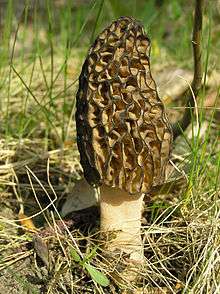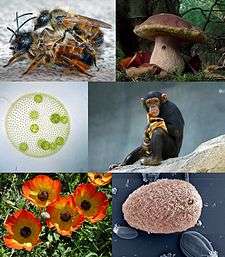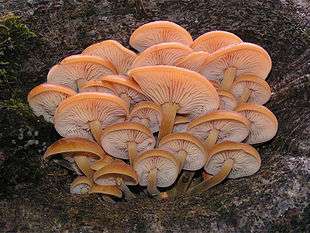Definify.com
Webster 1913 Edition
Fungus
Fun′gus
,Noun.
pl. L.
Fungi
(#)
, E. Funguses
(#)
. [L., a mushroom; perh. akin to a doubtful Gr. [GREEK] sponge, for [GREEK]; if so, cf. E.
sponge
.] 1.
(Bot.)
Any one of the
Fungi
, a large and very complex group of thallophytes of low organization, – the molds, mildews, rusts, smuts, mushrooms, toadstools, puff balls, and the allies of each. See fungi
. ☞ The fungi are all destitute of chorophyll, and, therefore, to be supplied with elaborated nourishment, must live as saprophytes or parasites. They range in size from single microscopic cells to systems of entangled threads many feet in extent, which develop reproductive bodies as large as a man’s head. The vegetative system consists of septate or rarely unseptate filaments called hyphæ; the aggregation of hyphæ into structures of more or less definite form is known as the mycelium. See
Fungi
, in the Supplement. 2.
(Med.)
A spongy, morbid growth or granulation in animal bodies, as the proud flesh of wounds.
Hoblyn.
Webster 1828 Edition
Fungus
FUN'GUS
,Noun.
1.
A mushroom, vulgarly called a toadstool. The Fungi constitute an order of plants of a peculiar organization and manner of growth. The word is also applied to excrescences on plants.2.
A spungy excrescence in animal bodies as proud flesh formed in wounds.The term is particularly applied to any morbid excrescence, whether in wounds or arising spontaneously.
Definition 2026
fungus
fungus
English
Noun
fungus (plural fungi or funguses)
- (mycology) Any member of the kingdom Fungi; a eukaryotic organism typically having chitin cell walls but no chlorophyll or plastids. Fungi may be unicellular or multicellular.
- 2013 July 20, “Welcome to the plastisphere”, in The Economist, volume 408, number 8845:
- Plastics are energy-rich substances, which is why many of them burn so readily. Any organism that could unlock and use that energy would do well in the Anthropocene. Terrestrial bacteria and fungi which can manage this trick are already familiar to experts in the field.
-
Synonyms
Hyponyms
Derived terms
Terms derived from fungus
Related terms
Translations
any member of the kingdom Fungi
|
|
Latin

fungus (a mushroom)
Etymology
Originally sfungus. Compare Ancient Greek σπόγγος (spóngos).
Pronunciation
- (Classical) IPA(key): /ˈfuŋ.ɡus/
Noun
fungus m (genitive fungī); second declension
Inflection
Second declension.
| Case | Singular | Plural |
|---|---|---|
| nominative | fungus | fungī |
| genitive | fungī | fungōrum |
| dative | fungō | fungīs |
| accusative | fungum | fungōs |
| ablative | fungō | fungīs |
| vocative | funge | fungī |
Derived terms
Related terms
- fungidus
Descendants
References
- fungus in Charlton T. Lewis and Charles Short (1879) A Latin Dictionary, Oxford: Clarendon Press
- fungus in Charlton T. Lewis (1891) An Elementary Latin Dictionary, New York: Harper & Brothers
- FUNGUS in Charles du Fresne du Cange’s Glossarium Mediæ et Infimæ Latinitatis (augmented edition, 1883–1887)
- Félix Gaffiot (1934), “fungus”, in Dictionnaire Illustré Latin-Français, Paris: Hachette.
- Meissner, Carl; Auden, Henry William (1894) Latin Phrase-Book, London: Macmillan and Co.
-
(ambiguous) to perform the last rites for a person: supremo officio in aliquem fungi
-
(ambiguous) to live a perfect life: virtutis perfectae perfecto munere fungi (Tusc. 1. 45. 109)
-
(ambiguous) to do one's duty: officio suo fungi
-
(ambiguous) to perform official duties: munere fungi, muneri praeesse
-
(ambiguous) to perform the last rites for a person: supremo officio in aliquem fungi


